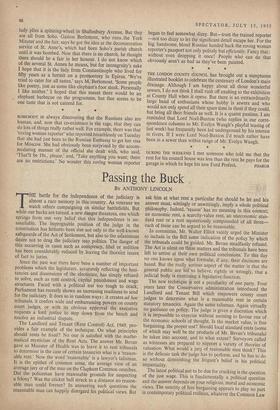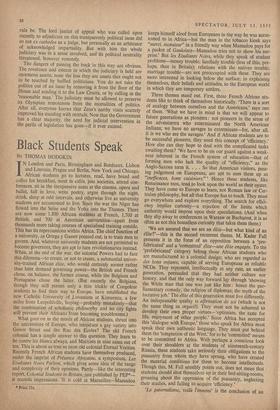Passing the Buck
BY ANTHONY LINCOLN THE battle for the independence of the judiciary is almost a race memory in this country. As veterans we watch others campaigning on similar battlefields. But while our backs are turned, a new danger threatens, one which springs from our very belief that this independence is un- assailable. The impregnable position of the judge in the constitution has hitherto been due not only to the well-known safeguards of the Act of Settlement, but also to the unanimous desire not to drag the judiciary into politics. The danger of this occurring in cases such as conspiracy, libel or sedition has been considerably reduced by leaving the thornier issues of fact to juries. , Since the past war there have been a number of important problems which the legislature. accurately reflecting the hesi- tancies and dissensions of the electorate, has simply refused to, solve, such as rent control, capital punishment and wage structures. Faced with a political nut too tough to crack, Parliament has recently shown an increasing readiness to send for the judiciary. It does so in random ways : it creates ad hoc tribunals, it confers wide and embarrassing powers on county court judges, or with its obvious approval the executive requests a lord justice to step down from the bench and resolve an industrial dispute.
The Landlord and Tenant (Rent Control) Act, 1949, pro- vides a fair example of the technique. On what principles should rents be fixed? No one is satisfied , with the mathe- matical mysticism of the Rent Acts. The answer Mr. Bevan gave as Minister of Health was to leave it to rent tribunals to determine in the case of certain tenancies what is a `reason- able rent.' Now the word 'reasonable' is a lawyer's talisman. It is the epithet of common sense, the average view of an average jury or of the man on the Clapham Common omnibus. Did the policeman have reasonable grounds for suspecting a felony? Was the cricket ball struck to a distance no reason- able man could foresee? In answering such questions the reasonable man can happily disregard his political views. But ask him at what rent a particular flat should be let and his answer must, wittingly or unwittingly, imply a whole political philosophy. Indeed, `reason' has no meaning in this context; an economic rent, a scarcity-value rent, an uneconomic stan- dard rent or a rent mysteriously compounded of all three— each of these can be argued to be reasonable.
In committee, Mr. Walter Elliot vainly urged the Minister to include in the Bill some indication of the policy 'by which the tribunals could be guided. Mr. Bevan steadfastly refused. The Act is silent on these matters and the tribunals have been left to arrive at their own political conclusions. To this day no one knows upon what formulae, if any, their decisions are based. But the really serious aspect of the matter is that the general public are led to believe, rightly or wrongly, that a judicial body is exercising a legislative function.
The new technique is not a peculiarity of one party. Four years later the Conservative administration introduced the Landlord and Tenant Bill which empowers county court judges to determine what is a reasonable rent in certain statutory tenancies. Again the same talisman. Again virtually no guidance on policy. The judge is given a discretion which it is impossible to exercise without seeming to favour one of the economic schools of thought. Is the market value, is free bargaining, the proper test? Should local standard rents (some of which may well be the products of Mr. Bevan's tribunals) be taken into account, and to what extent? Surveyors called as witnesses are prepared to support a variety of theories of valuation. What would a jury of reasonable men think? This is the delicate task the judge has to perform, and he has to do so without diminishing the litigant's belief in his political impartiality.
The latest political nut to be due for cracking is the question of the just wage. This is fundamentally a political question and the answer depends on your religious, moral and economic views. The sanctity of free bargaining appears to play no part in contemporary political realities, whatever the Common Law rule be. The lord justice of appeal who was called upon recently to adjudicate on this transparently political issue did so not ex cathedra as a judge, but personally as an arbitrator of acknowledged impartiality. But with him the whole judiciary was in a sense involved, and its political neutrality threatened, however remotely.
The dangers of passing the buck in this way are obvious. The reverence and esteem in which the judiciary is held are enormous assets; none the less they are assets that ought not to be touched by baffled politicians. You do not take the politics out of an issue by removing it from the floor of the House and sending it to the Law Courts, or by calling in the `reasonable man.' The judiciary must be allowed to preserve its Olympian remoteness from the mortalities of politics. After all, everyone knows that Zeus's earthy visits scarcely improved his standing with mortals. Now that the Government has a clear majority, the need for judicial intervention in the perils of legislation has gone—if it ever existed.



































 Previous page
Previous page